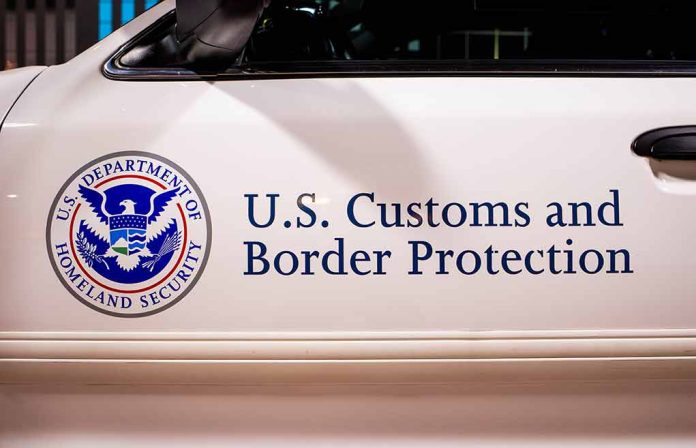
Border Czar Tom Homan lives apart from his wife due to escalating death threats against him and his family, revealing the personal toll of his commitment to securing America’s borders under President Trump.
Key Takeaways
- Tom Homan has separated from his wife for safety reasons due to death threats stemming from his role as border czar
- Despite financial sacrifices and personal hardships, Homan returned to government service at President Trump’s direct request
- Under Homan’s leadership, southern border crossings have decreased significantly, reaching record lows according to CBP data
- Homan’s wife encouraged him to return to the border czar position despite the sacrifices, telling him she’d divorce him if he didn’t take the job because he’d regret it
- Homan has faced intense protests, including approximately one thousand demonstrators at his Upstate New York home
Personal Sacrifices for National Security
Tom Homan, the White House executive associate director of enforcement and removal operations, commonly known as Trump’s “border czar,” is making extraordinary personal sacrifices in service to the nation. In a recent interview on the podcast “Pod Force One” with Miranda Devine, Homan revealed the extent of these sacrifices, explaining that his wife now lives separately from him primarily due to serious death threats. The threats have become so severe that the couple made the difficult decision to live apart as a safety precaution, with Homan visiting his wife “as much as he can” while balancing his demanding role.
“My wife’s living separately from me right now, mainly because I worked for many hours, but mostly because of the death threats against me. She’s someplace else. I see her as much as I can, but the death threats against me and my family are outrageous,” said Tom Homan.
The separation from his family extends beyond his wife. Homan has been candid about how his career ascension has limited his time with his children. While he was able to spend considerable time with his sons during their early years, his promotion to ICE director and now his return as border czar has significantly reduced family time. The intense pressure and demanding schedule of coordinating national border security efforts have created a situation where personal connections have been necessarily sacrificed for professional obligations.
Answering the Call to Serve
Homan’s return to government service came directly at the request of President Trump following his 2020 re-election. The moment held special significance for Homan, who was dining with his wife when his phone displayed a call from “POTUS.” His wife immediately recognized the implication, anticipating Trump’s request for Homan to return to service. Despite enjoying success in the private sector after his previous stint in the Trump administration, Homan felt he couldn’t refuse the president’s personal request to help address the border crisis.
“I was the first person he called, bringing back, which, again, was a proud moment, but I was actually out to dinner with my wife, and then my phone rang, and I looked down, and it says, ‘POTUS.’ And my wife says, ‘He’s asking him to come back, isn’t he?'” said Tom Homan.
Homan’s wife, despite being in the middle of home renovations and aware of the financial implications of leaving the private sector, strongly encouraged his return to public service. In a striking display of understanding her husband’s passion for border security, she delivered an ultimatum that revealed how well she knew him. Her insistence that he accept the position or face divorce stemmed from her recognition that he would deeply regret not answering the call to serve, and she didn’t want to “live with four more years” of his frustration.
Proven Results Amid Controversy
Since taking on the border czar role, Homan has delivered tangible results in securing America’s southern border. According to U.S. Customs and Border Protection data, border crossing numbers have decreased significantly under his leadership, reaching record lows. These achievements build upon his successful tenure as acting ICE director during Trump’s first administration, where he implemented effective enforcement measures that significantly reduced illegal crossings and enhanced national security.
“I spent a lot of time with my boys growing up, but as I got more and more — climbed the ladder of what I’ve done with ICE director and now back — I don’t see my family very much,” stated Tom Homan .
Despite these successes, Homan has faced intense opposition, including protests involving approximately a thousand demonstrators at his Upstate New York home. He has also had to defend ICE operations, particularly in Los Angeles, where he clarified that recent enforcement actions were part of criminal investigations involving money laundering and customs fraud—not indiscriminate raids as portrayed by critics. Homan has consistently challenged Democrats who use immigration as a political tool, questioning what downsides could possibly exist to having a secure border that protects American citizens.
Commitment Above Personal Comfort
Homan’s willingness to endure family separation, financial sacrifices, and personal threats demonstrates an extraordinary level of commitment to national security. His experience as a career law enforcement officer has given him unique insights into the complex challenges of immigration enforcement, and his results-oriented approach has proven effective in addressing border security concerns. The personal cost of his service underscores the intense pressures faced by officials tasked with implementing controversial but necessary security measures.
“Even my wife said, ‘You know, it’s a huge pay cut,’ because I’m doing good in the private sector. She’s in the middle of remodeling — months of stuff — and all that stopped because I’m leaving the private sector, going back to a government paycheck,” said Tom Homan.
While Homan has faced criticism and threats, he has also received support from unexpected quarters, including praise for New York Mayor Eric Adams for prioritizing public safety. This recognition of bipartisan concerns about the impacts of uncontrolled immigration reflects Homan’s pragmatic approach to a divisive issue. His dedication to securing America’s borders, despite the significant personal cost, exemplifies a level of public service that puts national interests above individual comfort—a standard that many Americans wish to see in their government officials.



